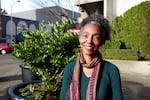
Cecelia Towner is the founder of Black Lives Matter Vancouver, Washington.
Molly Solomon / OPB
Local residents are pressing public schools in southwest Washington’s Clark County to observe Black History Month this February.
Leading the call is Cecelia Towner, the founder and organizer of Black Lives Matter Vancouver, Washington.
Last year she was surprised to learn that observing Black History Month was largely voluntary – and a lot of local schools weren’t doing anything at all.
“At a school-wide level, it wasn’t happening. And as a district, it certainly wasn’t happening,” said Towner. “So that became the priority.”
Towner recently met with Vancouver Public Schools and has already started collaborating with Evergreen Public Schools. She hopes to create a toolkit curriculum by January to share with district administrators. It will include lesson plans, daily classroom prompts, and a list of historically significant African-Americans.
“Vancouver Public Schools is committed to social justice, equity and celebrating the cultural diversity in the community we serve,” said Vancouver Public Schools Communications Director Patricia Nuzzo in an emailed statement.
“In past years, our district has honored and recognized the contributions of Dr. Martin Luther King Jr. in January and Black History Month in February, and we will continue these important traditions in and beyond 2018,” Nuzzo added.
Gail Spolar, director of communications and community engagement with Evergreen Public Schools, said the district will work with Towner, who will provide resources on Black History Month to “complement the diversity and equity focus we already provide in our schools that happens not only in February, but throughout the school year.”
Washington state social studies standards include lessons on slavery and the civil rights era, but still fall short, according to a 2014 study by the Southern Poverty Law Center. The center gave Washington a "D" grade in its Teaching Tolerance report, which found coverage of the civil rights movement in classrooms nationwide remains woefully inadequate.
If Clark County schools move forward with Towner’s plan, Black History Month would be expanded into every public school classroom. Towner says that’s an important step, even in predominantly white Clark County. Latest census figures show the county is 87 percent white, with about 2 percent of the population identifying as black.
Towner, who grew up in the Crenshaw District in South Central Los Angeles, remembers being bused to predominantly white schools, where black history was rarely taught. As a black woman, not seeing herself in history books left an impression.
“There’s this whole mythology of who we are. We’re rarely human beings and we’re often portrayed as negative people,” said Towner. “And so, it’s really important for a very white school to have Black History Month so that it counters some of the stereotyping children are otherwise going to get.”
A push for more diverse educational programming is gaining steam in the Pacific Northwest. In Seattle, the NAACP is urging the school district to add ethnic studies curriculum in public schools. And this summer, Oregon became the only state to require ethnic studies for K-12 students.
Towner says Vancouver could soon follow suit, by moving to officially observe Black History Month in Clark County public schools.
“Black voices have always been powerful. We’ve always really contributed to this country,” said Towner. “To uplift that we can do that here is powerful.”